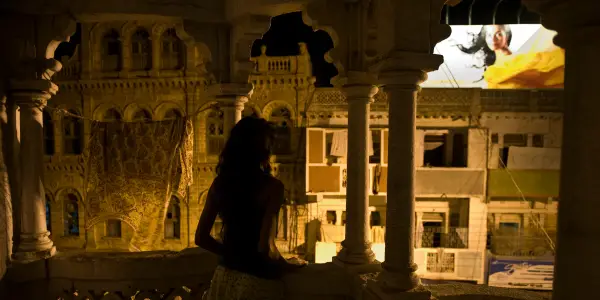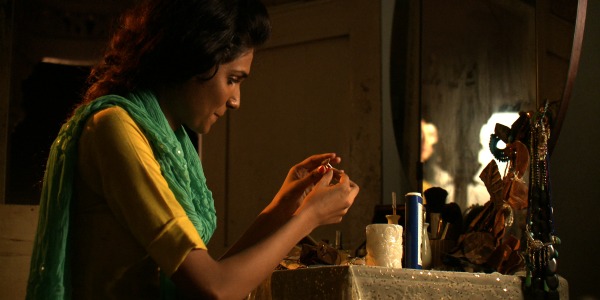GOOD MORNING KARACHI: The Pakistani Devil Wears Prada

Alistair is a 25 year old writer based in Cambridge.…
At one point in Good Morning Karachi, a fashion photographer is vocal about the contemporary image of Pakistani femininity and culture he believes his photos represent. He claims that his company is the “women’s revolution the country has been waiting for” and that a simple fashion photoshoot can portray a more forward-thinking society to international citizens who portray Pakistan as a bunch of “fundamentalists”.
Yet the views about femininity presented by director Sabiha Sumar in Good Morning Karachi are as confused as those presented by a photographer who believes photos of supermodels represents a realistic feminist ideal and aspiration in society.
A distinctively Western tale being told in a society that couldn’t be more different
In her film, Pakistan is depicted as having only two different social classes: the religiously conservative who don’t believe in the portrayal of femininity, and the higher classes, who seem to equate partaking in a more Americanised cultural ideal with success. There is no middle ground to this thesis – Pakistan is suggested as not being allowed to have a positive cultural identity of its own, having to give in to the “aspirational class” system of the West (and all its capitalistic ideals) in order for its citizens to live a fruitful life.

No wonder the film feels not just socially confused, but misjudged and outdated – the film was originally scheduled to be released in 2011, then shelved until 2013 for a film festival debut, then continued to be unreleased in its homeland until 2015. Even half a decade ago, it would be hard to see this film as anything other than an equally shallow cousin to The Devil Wears Prada or the Sex and the City movies – its pretensions to social commentary lost in the midst of unironically celebrating the lifestyle of Western culture at its most vacuous.
The story is a simple “wish fulfilment” fantasy that has been told countless times before and will likely be told for generations to come. Rafina (Amna Ilyas) is a working class girl, staring at the model on the billboard opposite her family’s apartment, forever longing for a break in modelling. With no education qualifications, she uses her connections to land her a job working as an assistant in a local modelling agency, where, after about 10 minutes of the running time spent getting hot beverages for clients, instantaneously is spotted by talent managers and used in a high profile campaign.
This is one of those high profile campaigns that only appears in movies; one that goes nationwide about an hour after the photoshoot happens, in a way that is entirely inexplicable. The most commendable thing is that the film is clearly trying to suppress the urge to use every narrative cliche here; it’s a major surprise that Rafina wasn’t introduced wearing glasses with her hair tied up, only to take them off and reveal herself to be superficially beautiful to photographers.
A feminist filmmaker presents a confused view of modern femininity
The film is Sumar’s long gestating follow-up to her internationally acclaimed 2003 debut feature Silent Waters. That film, as well as her numerous documentary features, critically lived up to the her directorial statements that her films are works of social criticism designed to make worldwide audiences aware of female societal struggles in Pakistan.
This film spectacularly fails to do so; it’s socially relevant subject matter is handled in a way that makes it seem as faux-aspirational as any Nancy Myers movie, instead of being a dissection of why there is such a disparate cultural difference between classes in contemporary Pakistan. When the gritty realism arrives, it arrives in the form of religious fundamentalism that was berated as being unrepresentative of modern Pakistan earlier in the film.

Instead of producing a work that upends stereotypes, the movie feeds into them, offering no deep commentary that differentiates it from the average Middle Eastern news report in right-wing Western media.
The filmmaking is as unfocused as its narrative: at one point we hear the same voice-over being used in two different scenes, within a minute of each other. In a celebration of luxury and how we should aspire to it above everything else, it is ironic how messy Good Morning Karachi is stylistically.
Its existence is an alarming notification that Eastern territories are quickly becoming Westernised, with a language barrier and cultural identity likely to disappear in the coming generations. In this respect, it is much like the Chinese film franchise Tiny Times, a franchise lucratively successful in its homeland, despite its love for all the Western signifiers of success that the restrictive Chinese government want to suppress to maintain their own cultural identity.
That franchise is essentially the Eastern Sex and the City, with four entries to the ongoing saga that have all been met with disdain by local critics and audiences, due to how Americanised they feel. If Good Morning Karachi is presenting the same distinctively Western ideals to audiences in a different foreign locale, then it is sad to say such scathing reviews are equally applicable here.
Conclusion
Good Morning Karachi simplifies the ideas the director has about Pakistani culture to an extent that it merely feels like Pakistan is a society equivalent to the US, with those holding on to its old, unique identity clearly being depicted as villains suppressing change. Changing the more archaic social views of the nation for a society equally inclusive to women is a perfect ideal – changing it to the extent it is stripped of a singular identity represents globalisation at its worst.
What are the best contemporary depictions of non-Westernised cultures?
Released in its homeland last year, Good Morning Karachi is still without a proper international release. Dates of festival screenings can be found here.
https://www.youtube.com/watch?v=ca54MOjzI6Y
Does content like this matter to you?
Become a Member and support film journalism. Unlock access to all of Film Inquiry`s great articles. Join a community of like-minded readers who are passionate about cinema - get access to our private members Network, give back to independent filmmakers, and more.
Alistair is a 25 year old writer based in Cambridge. He has been writing about film since the start of 2014, and in addition to Film Inquiry, regularly contributes to Gay Essential and The Digital Fix, with additional bylines in Film Stories, the BFI and Vague Visages. Because of his work for Film Inquiry, he is a recognised member of GALECA, the Gay & Lesbian Entertainment Critics' Association.













